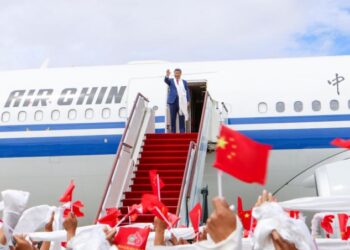Cheers in a football match between the Changzhou team and that of Nanjing, in Changzhou, the city of the Chinese jiangsu province (east), June 21, 2025. (Photo: Li Bo)
On the evening of June 21, a football match between the Changzhou team and that of Nanjing took place in Changzhou, the city of the Chinese province of Jiangsu (East).
This match attracted 36,712 spectators, but many more people who could not obtain tickets followed the live derby on dozens of platforms.
It was the latest match to date from “La Super League du Jiangsu”, which currently ignites the passions in China.
Composed of 13 teams each representing a city in the province, the football tournament won the hearts of millions of people.
The passion for football is deep across the country. Unlike professional leagues, the Jiangsu Super League attracts amateurs from all walks of life: high school students, couriers, computer scientists, etc.
Its attraction is reinforced by a dynamic cultural identity. The teams are decked out of nicknames from their city specialties – Wuxi is symbolized by peaches, while the provincial capital, Nanjing, is by its famous duck.
“All this is very fun,” notes Wang Lin, a football fan of the city of Wuxi. “These popular slogans and traditions help us rediscover our local identities. More and more occasional supporters are transformed into enthusiasts.”
The championship has transformed into a real feast of local pride and sporting pleasure, where laughs, jokes and loyalty mingle in the stands and online. This enthusiasm has boosted tourism and local cultural consumption.

Supporters of the Nanjing team on an chartered train to Huai’an, before a football match between the Nanjing team and that of Huai’an, in Nanjing, capital of the Chinese province of Jiangsu (East), June 14, 2025. (Photo: Su Yang)
“I want to live this atmosphere from inside the stadium and enjoy it for an escape weekend,” said Xu Qinghuai, a supporter of the Changzhou team.
The figures speak for themselves! From June 13 to 15, tourist and cultural expenses in Wuxi via Unionpay reached 581 million yuan, up 21% compared to the previous weekend. Night cultural consumption alone jumped 31% on the day of the match.
“Even when the team loses, the city wins there on all levels,” read a viral commentary on social networks, summarizing the spirit of this popular phenomenon.
On June 14 and 15, during the organization of a match in Huai’an, the city received 497,100 visitors, an increase of 45.78% compared to the previous weekend. At the same time, 30,000 people participated in the Xuyi crayfish festival in Huai’an, consuming some 103 tonnes of crayfish in a single weekend.

A cook prepares crayfish during a fair in a football match between the Huai’an team and that of Nanjing, in Huai’an, city of the Chinese province of Jiangsu (East), June 14, 2025. (Photo: Li Bo)
Changzhou and Huai’an are not the only cities whose cultural and tourist services have experienced a boom. Before the start of the championship, these 13 cities in Jiangsu had adopted measures to promote tourism and cultural consumption: free admissions in tourist sites, catering discounts, accommodation at broken prices …
During a recent meeting on the economy, the governor of Jiangsu, Xu Kunlin, urged officials to take full advantage of the Jiangsu Super League to promote in -depth integration between culture, tourism, sports and trade and promoting an economy stimulated by consumption.
“Sports events now generate significant crowds not only, but also targeted tourism consumption,” said Wu Guoping, president of a tourist and cultural development company in Wuxi. “This encourages cities to innovate and improve their tourist offer.”






![[C Finance]State Administration for Market Regulation: Keep the bottom line of quality and safety to make the New Year “fireworks rise”](https://beijingherald.com/wp-content/uploads/2025/01/C-FinanceState-Administration-for-Market-Regulation-Keep-the-bottom-line-120x86.jpeg)

